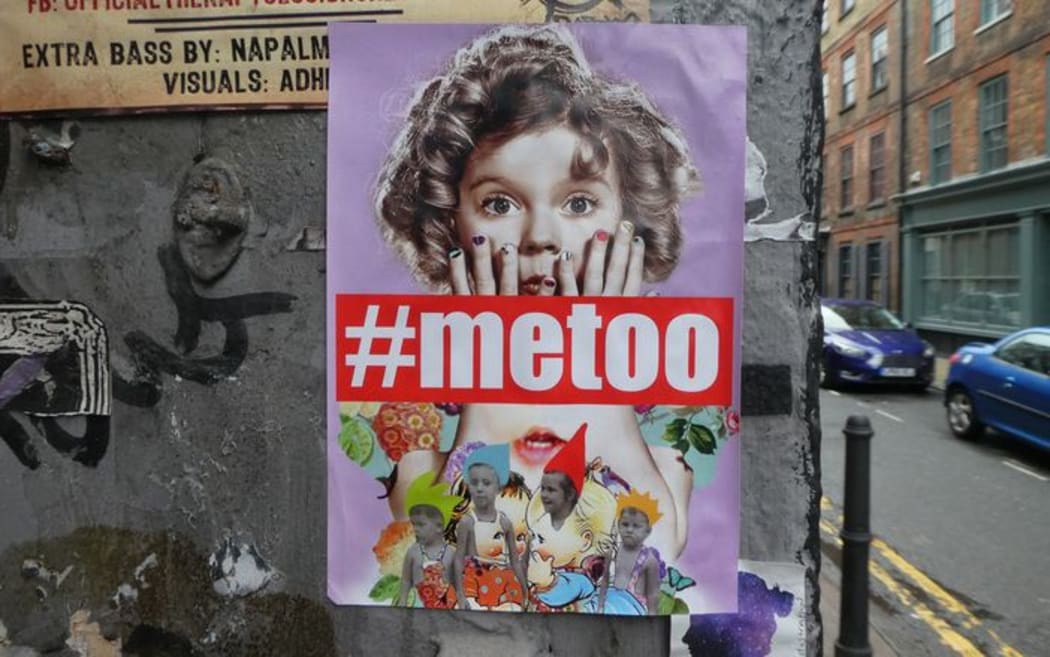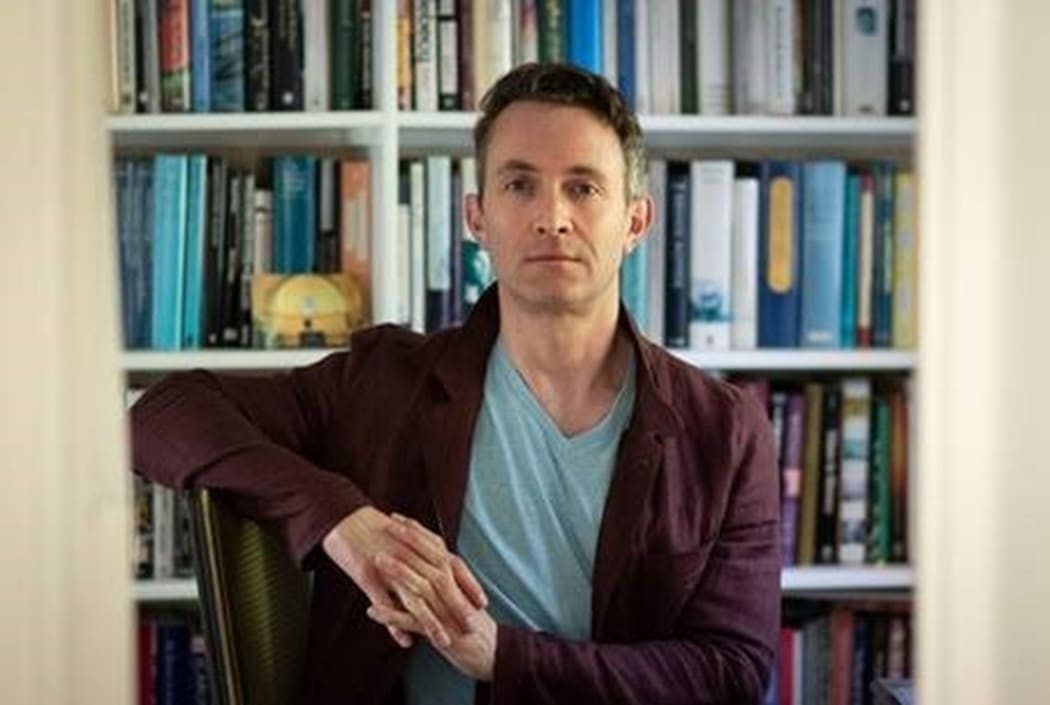Divided by our race, gender and sexual orientation - it sounds like a bigoted society, but a controversial British author says it's what is advocated by tyrannical 'wokeness' where our differences are given higher priority than our sameness.
Douglas Murray challenges "wokeness", identity politics and groupthink in his new book The Madness of Crowds: Gender, Race and Identity.
In the book, described as a 'right wing diatribe' by The Guardian, he examines public discourse around the hot-button issues of gender and race and considers the role that technology and the #MeToo movement has played in the culture wars.

#MeToo poster in London. The movement to demonstrate the prevalence of sexual harassment has gone worldwide. Photo: duncan c/Flickr
Murray tells Kim Hill the book was an attempt to speak carefully and humanely but also honestly about some of the most divisive issues our time.
“We’re not thinking about them very well. We’re getting into silos, we’re getting into factions. As a result, we’re in this strange position of pretending we know about things we don’t know about, and pretending to not know about things we all knew until yesterday.”
The book touches on four particular areas, gay people, women, trans people and race.
“I wanted to explain, as I do in interlude chapters, why these issues in particular appear to have been weaponised in recent years to the extent that in our politics and culture we see this way in which gay people are being used against straight people, women against men, people of different races against each other.
“It’s really a call to say, let’s try and be more reasonable about this, try to be honest about this. And, for goodness sakes, stop this weaponisation.”
Murray makes a distinction between what he calls hardware and software when it comes to sexuality and race.
In his previous book, he said that western democracies had no narrative to explain what we’re doing or should do with our life other than more of the same.
“In the latest book I explain why these sorts of social justice people, in particular, people are seeking to find meaning. One of the other things I tried to do was to say - if we don’t have an abiding narrative - what other things do we broadly still agree on being foundational ethics.
“One of them, and I describe this in the gay chapter, is that the movement of gay rights in recent decades occurred because an argument was made and was, broadly speaking, agreed upon by the general public. It’s that being gay, and I happen to be gay myself, isn’t a lifestyle choice as some have suggested… it’s the Lady Gaga option of ‘Born This Way’ and I think this is helpful because we agree that you shouldn’t be mean to people or unpleasant to people because of a hardware issue. They can’t help it.”
He says it’s similar to people who have disabilities, we agree - or at least should - to not be mean to people born with disabilities because they didn’t chose it and can’t help it. He says things get thorny here because every rights campaign wants to push to be seen as hardware.
“In recent years, this has caused an awful lot of problems for two reasons in particular. The first is the trans movement. Trans have been trying to say in recent years that this is a hardware issue like gays, because it’s seen as one way of getting some sympathy or support.
“The problem is, among other things, this comes at the same time as there has been a very strange move that has basically spilled out from the American academy to claim that being a woman is basically a matter of choice. That gender is about performativity, that there is no such thing as gender. This is a profoundly disturbing thing.”
He says it’s a paradox to say that being trans is a hardware issue, that you can’t help but be born female in a male body, but gender is a software issue, that you choose to be a woman.
“I think an enormous amount of pain in our society is coming from trying to make idea jumps like that.”
Murray explains that no long ago, woke was used as a praising term for someone who was hyper aware of intersectional matters of class, race, gender and sexuality while acknowledging and sometimes apologising for their own privilege. Recently, being ‘woke’ has become a bit less cool.

Douglas Murray Photo: Supplied / Andy Ngo
“It’s kind of overstretched and so a lot of people have been taking the mickey out of the woke in recent years and a lot of people themselves aren’t so keen to be described as woke.”
He says ‘woke’ is a movement with reasonable goals in mind but is highly condemning of people who are born white, male and straight.
“One of the problems of the movement, as I identify it, is that it actually makes things worse at the point where many of us think they were getting better. Many of us don’t like the weaponisation of gays against straights or the weaponisation of women against men, we don’t want races to be used against each other.”
He says the woke movement does all these things and in trying to diminish things such as homophobia, it actually risks increasing it by inflaming a tension between straight and gay people.
In the book, Murray recalls Martin Luther King’s call for a nation where people were judged not by the colour of their skin, but by the contents of their character. He says, now, people are insisting on being judged by the colour of their skin.
“It’s a very disturbing trend in recent years that I identify and lay out multiple examples across popular culture, academia, politics and much more. I quote an example from a professor of ‘whiteness studies’ who gave a speech at Boston University earlier this year where she said judging people by the content of their character, rather than the colour of their skin was dangerous.
“There are people now for whom, instead of Martin Luther King’s beautiful idea of the content of someone’s character being the thing, are actually trying to reduce all of us to our sex or gender, cis or trans, black or white. Many of us would rather stick to that dream of Martin Luther King’s than this world in which, actually, everybody is to be judged on characteristics we can’t help and are of limited utility or perhaps no utility in judging our fellow men and women.”
Although movements like Black Lives Matter are a response to racist attacks and killings by police, which demonstrate racial tension is still highly fraught and not at a stage dreamed of by Martin Luther King, Murray says we shouldn’t generalise these problems to the wider population.
“Why don’t we try to address problems like racism, sexism, homophobia and so on where they exist rather than, when such things are discovered, turning on all the people who have a particular characteristic.”
He gives the example of a lesbian couple who were punched on a London bus which received huge coverage earlier this year.
“It’s a terrible thing, but it’s highly unusual which is why we have this attention on it and it doesn’t mean we should pretend London is incredibly homophobic.”
The chapter likely to cause the most controversy is the one on women in which he suggests that women who dress and make themselves up in a revealing or sexy way shouldn’t blame men for being confused.
He explains that there’s a “polite pretence” that women only dress attractively to make themselves feel good, rather than to appeal to the opposite sex.
“This is not the case and everybody knows it. I suggest people look at the way women are advertised because a large amount of it, very clearly, is about trying to make oneself attractive to the opposite sex, and there’s nothing wrong or shameful about that.
“We’ve sort of got this embarrassment about it and we’re trying to cover it over. One of the problems about that is our society is at risk of presenting women as terrible victims and women have to be helped by men not to be victims.”
Murray aligns himself with second-wave feminists who say women are at least as powerful as men and are worried about this presentation of women as being somewhat helpless.
He says that what happened with the MeToo movement and how it revealed that Harvey Weinstein was an alleged serial rapist doesn’t mean all men should be tarred with the same brush.
“It’s a reminder of why Hollywood is a very bad place to base our ethics or our understanding of society. Hollywood is a very poor place to do that because its always been a strange and unusual place. It’s the place where the casting couch was invented.”
Murray believes that the MeToo resulted in an overcorrection of a power imbalance which ended up with people like the comedian Aziz Ansari having their reputation destroyed over a bad date.
Murray says young people jump on board these movements because their lives are very precarious and it gives them something to be a part of and believe in. A similar thing, he says, is happening with the Extinction Rebellion movement which has become larger than a climate change protest and is instead a quasi-religious group.
“There are people who are searching for a deep form of meaning in a form of activism. It’s a very millenarian movement at this stage… I’m urging people away from herd behaviour like that.”
In Murray’s view, women’s rights, gay rights and racial equality appeared to be much improved, but because the need to fill the void of meaning in our increasingly secular societies, people have invented causes and become over sensitive.
Furthermore, he says, there is an assumption of privilege of people who don’t belong to a marginalised group without any acknowledgement of the struggles they may have encountered.
“We pretend that the only people able to talk about these things are the people who are themselves of that group and I don’t agree with this fragmentation of society in any of its forms.”

